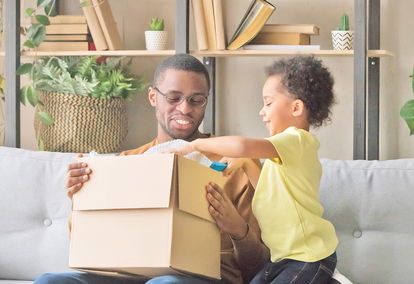Ways to Help Preschoolers When Their Families Move

Preschoolers need stability. That is why routine and consistency are important for them. When changes shift their foundation, they may “lose their footing” and feel at risk. A family move can have this effect on preschoolers. It can manifest in all types of behaviors like tantrums, crying, and lashing out, as well as heightened shows of emotion such as sadness, fear, and anger.
So how can we help preschoolers during a transition of moving? We can hone our listening and preparation skills while addressing their short-term needs and help them to develop long-term coping skills.
Here are some things we as parents and caregivers can do to help preschoolers deal with the stress of moving.
Share information with preschoolers.
- Keep preschoolers informed in terms they can understand.
- Remember to keep it simple but honest. For example, say, “We are moving to a new house to meet our family’s needs. There is room for us and our stuff in the new space.”
- Teaching preschoolers that information helps us understand the transitions we face is a tool they will be able to use throughout life.
Listen intently and intentionally.
- Focus on what the child is communicating verbally and non-verbally.
- Read their body language (fear in their countenance or teary eyes) as well as processing their words, “I’ll miss my room.”
- Identify their emotions and what may be influencing them. For example, he or she may fear there will not be enough room for all their belongings in the new place and they may be forced to give up treasured items.
- Encourage preschoolers to share their thoughts and emotions.
- Offer simple, tangible reassurances. Take him or her to see their new space or show them pictures whenever possible.
- Let them help with packing so they see that all their personal stuff is going with all the family stuff to the new place.
- Teaching preschoolers to express their feelings will help them throughout life.
Pack intentionally.
- Keep items of importance to your child with him or her during the move. A favorite blanket can travel with you rather than with the movers.
- Pack a special box filled with your child’s most treasured items that will be unpacked first by the movers. If at all possible, make this box, along with their room contents, the first things to be unpacked. This not only reassures your child that their personal items made it, but it will also provide stability in a new place and it can occupy them while you continue the unpacking process.
- Recognizing the needs and providing for your preschooler will help solidify their ability to trust you with difficult issues in the future.
Maintain routine.
- Even during the move, strive to keep the child’s routine in place. Setting their bedroom up first allows for the continuation of bedtime rituals.
- Pack so that your daily habits go on like normal—bath time, brushing teeth, bedtime story book, and favorite cereal bowl. This requires careful and thoughtful planning, but it is so worth the effort because it provides stability and much needed consistency for your child.
- Sustaining a routine is a habit that preschoolers can use throughout adulthood.
As always, pray with and for your preschooler as they face new opportunities and challenges like moving to a new home. Teaching them to pray about everything is one of the most important things you will ever teach them.
Gina Smith has been crazy about missions ever since she was a Sunbeam. One of her greatest joys in life is teaching people about Jesus and doing hands-on missions. She has been a missions educator since her early teens and has written for WMU for 18 years.
Disclaimer: The information shared on this page is not meant to diagnose or treat a mental health condition. We encourage you to follow up with your health-care provider and seek a mental health professional for individual consultation and care.